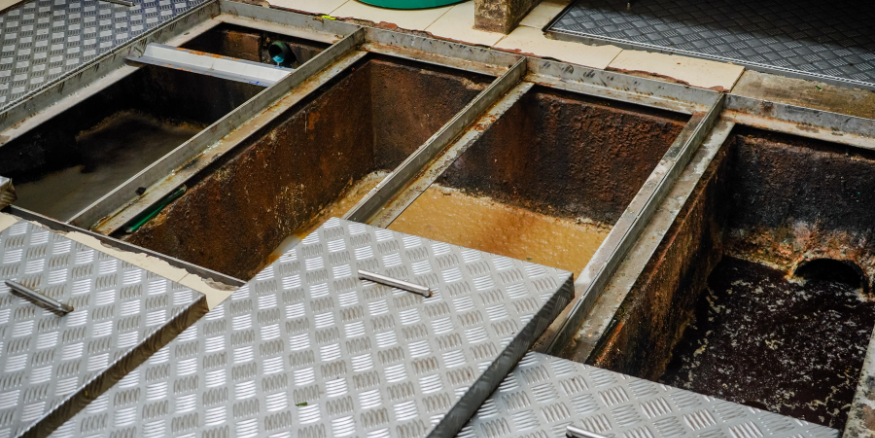Grease interceptors, also known as grease traps, play a critical role in commercial kitchens by preventing fats, oils, and grease (FOG) from entering the sewage system and causing blockages. Traditional metal grease interceptors have been the standard for many years, but they come with limitations, including their heavy weight and difficult installation process. In recent years, plastic grease interceptors have emerged as an innovative solution to these problems.
They offer several benefits for keeping kitchens clean and safe, making them a popular choice for commercial kitchens. With proper installation and regular maintenance, manufacturing grease interceptor can effectively capture and remove FOG, ensuring a safe and clean environment for both workers and the surrounding community.
Overview of traditional metal grease interceptors
Metal grease interceptors have been the industry standard for many years, but they have several limitations. They are heavy and difficult to install, making them time-consuming and expensive. They are also prone to corrosion and rust, which can lead to leaks and contamination of the surrounding area. Metal grease interceptors can also be challenging to clean, and they require specialized cleaning services to ensure they are functioning correctly. Overall, traditional metal grease interceptors can be costly and inconvenient for commercial kitchens.
Introduction to plastic grease interceptors
Plastic grease interceptors provide a solution to the limitations of traditional metal interceptors. They are lightweight, making them easy to transport and install. Plastic interceptors are also highly resistant to chemicals, ensuring that they are durable and long-lasting. They do not corrode or rust, which eliminates the risk of leaks and contamination. Additionally, plastic grease interceptors are easy to clean, and they do not require specialized cleaning services. By using plastic grease interceptors, commercial kitchens can keep their facilities clean and safe while reducing costs and minimizing downtime.
Lightweight and Easy to Install
Plastic grease interceptors are significantly lighter than metal interceptors, making them easy to handle and transport during installation. They also have a simple and quick installation process, which can reduce installation time and labor costs.
Chemical Resistant and Durable
Plastic grease interceptors are highly resistant to chemicals, including cleaning agents and FOG, making them durable and long-lasting. They are less prone to corrosion, which can cause metal interceptors to deteriorate over time.
Non-Corrosive and Long-Lasting
Unlike metal grease interceptors, plastic grease interceptors are non-corrosive, which makes them ideal for use in corrosive environments such as commercial kitchens. They also last longer than metal interceptors, reducing the need for frequent replacements.
Efficient Removal of FOG from Wastewater
Plastic grease interceptors efficiently remove FOG from wastewater, preventing it from entering the sewage system and causing blockages. This ensures that kitchen drains and plumbing remain free of clogs and backups.
Prevention of Clogs in Plumbing and Sewer Systems
By removing FOG from wastewater, plastic grease interceptors prevent clogs and backups in plumbing and sewer systems. This reduces the risk of costly repairs and downtime in the kitchen. Plastic grease interceptors prevent the buildup of FOG, which can produce unpleasant odors and promote the growth of bacteria. This helps to maintain a clean and sanitary kitchen environment.
Compliance with Fire Safety Codes
Plastic grease interceptors comply with fire safety codes by preventing the buildup of flammable materials such as FOG. This reduces the risk of kitchen fires and ensures compliance with local regulations.
Reduction of Slip and Fall Accidents due to Grease Buildup
By preventing the buildup of FOG, plastic grease interceptors reduce the risk of slip and fall accidents in the kitchen. This improves kitchen safety for both employees and customers. Plastic grease interceptors prevent hazardous waste from entering the environment by keeping FOG out of the sewage system. This helps to protect the environment and comply with environmental regulations.
Passive Grease Interceptors: Passive grease interceptors rely on gravity to separate FOG from wastewater. They are ideal for smaller kitchens with lower FOG volume.
Automatic Grease Interceptors: Automatic grease interceptors use sensors to detect FOG and automatically remove it from the wastewater. They are ideal for larger kitchens with higher FOG volume.
Combination Grease Interceptors: Combination grease interceptors combine the features of passive and automatic grease interceptors, providing effective FOG removal for medium-sized kitchens.
Conclusion
Plastic grease interceptors offer numerous benefits for commercial kitchens, including their lightweight design, chemical resistance, and durability. They efficiently remove FOG from wastewater, prevent clogs in plumbing and sewer systems, and reduce unpleasant odors and bacteria growth. Additionally, they ensure kitchen safety by complying with fire safety codes, reducing slip and fall accidents due to grease buildup, and preventing hazardous waste from entering the environment. There are several types of plastic grease interceptors available, including passive, automatic, and combination interceptors, and choosing the right one requires considering factors such as sizing, capacity, and quality. Regular maintenance and cleaning are crucial for optimal performance.


